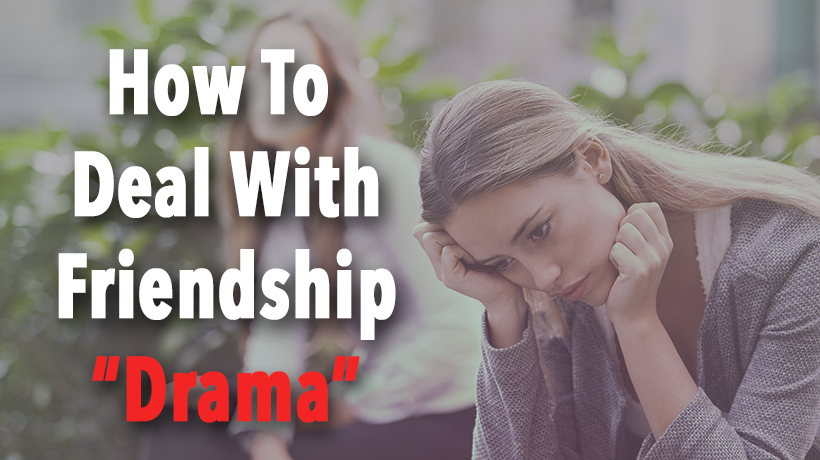The “frenemy”. We’ve all been there. You go to lunch or coffee to catch up with an old friend and find yourself feeling more drained and negative than when you walked in. There’s something about time with this friend that doesn’t feel…well…like time with a friend.
Perhaps you love the person, but your differences of opinion are hard to get passed or there were some hurtful words and actions you can no longer stomach. It could be that this friendship worked well at a different time when you were a different person, but since then you’ve grown and the dynamic is different.
While these occasions are common, for some reason many of us have a hard time cutting the ties on toxic friendships. We return out of a false preconception of loyalty, or memories of a better time, rather than taking the situation at face value and making important choices for our own mental and emotional health.
If you’ve reached a crossroad with one (or more) of your friendships and are hoping to find a resolution, read on for more information on steps to take next.
Figure Out What YOU Want
There’s an old saying that says that people are with us for “a reason, a season, or for life”. It’s important to know which camp your friendship falls into:
A reason: Did this person help you in a specific way but that kind of mentoring or growth has served its purpose?
A season: Was this person important to you at a time in your life when you shared more in common but now you don’t share the same priorities or values?
For Life: Has this person witnessed your life and provides an important source of continuity for you? Do you have an underlying love and connection to him/her?
If the person is in your life for a reason or a season, you may consider spending less time with that person or setting boundaries around your friendship with them. If you are growing in a different direction, it may even be time to let the friendship come to an end, and “swipe to the left…”
If the person is a friend ‘for life’ (whatever that might look like) then its worth trying to move past the conflict.
Try to get crystal clear on what you truly want before trying to make any kind of resolution. If the person is important to you in an ongoing way, it may be time for a conversation to occur.
Be Impeccable for your 50%
It’s all too easy to place ourselves in a victimized narrative where we’ve been the perfect friend to a not so caring companion. However, is this really the case?
Practice compassion by putting yourself in your friend’s shoes and seeing, Are you listening and showing interest in your friend’s life? What could YOU do to make the situation better?
Before you approach your friend to resolve your conflict, think first about what YOU might be contributing to the situation.
Raise the Conflict with a Neutral Tone
Its best to have a conversation rather than “sweeping it under the rug” to resurface at a later date, with even more hurt feelings.
If your end goal is to save your friendship, then don’t start the conversation like your trying to pick a fight on a reality show. At the end of it all, you’re not looking to “win”. What you want is a solution that allows you to stay in your friendship. So check your ego at the door, pull up those big girl panties and do what you need to do.
Put on your “therapist hat” and try and navigate the conversation in a calm and neutral tone.
Approach the conversation with a neutral “pre-frame” such as “It’s been feeling tense between us. I’d really like to see if we could get back to the ease we used to have. I’d like to hear what is going on for you, and share with you what I’ve been experiencing to see if we can find a better way”…
Give plenty of time for your friend to share what they have experienced within the friendship and resist the urge to interrupt, discredit, or shift blame. If you find you are rolling your eyes, you may not still have a strong bond with this person!
Share your own feelings as well. But make sure that you’ve thought it through by writing in a journal, talking to a family member/ friend, or therapist or coach, in order to make sure your feelings are really about your friend and not a familiar pattern you are repeating throughout your life.
If you have trouble speaking on the spot it may help to write down what you want to say ahead of time. Keep it brief, direct, and to the point.
Move Forward from the Conflict
If the conversation reaches a point where neither of you can come to an agreement, it might be best to find a new way of staying connected to that person, such as only going out in groups. This is the alternative to continuing to beat a dead horse when your friendship is what you’re really hurting.
Consider how to accept and love each other for who you are, despite your differences, and come up with strategies that can help avoid miscommunication or hurt feelings in the future. It might make sense to avoid certain topics and stay connected on what binds you.
Great friendships are few and far in between, and if you’re lucky enough to have one, it’s worth fighting for.
The insights in this article are the opinion of the writer.



